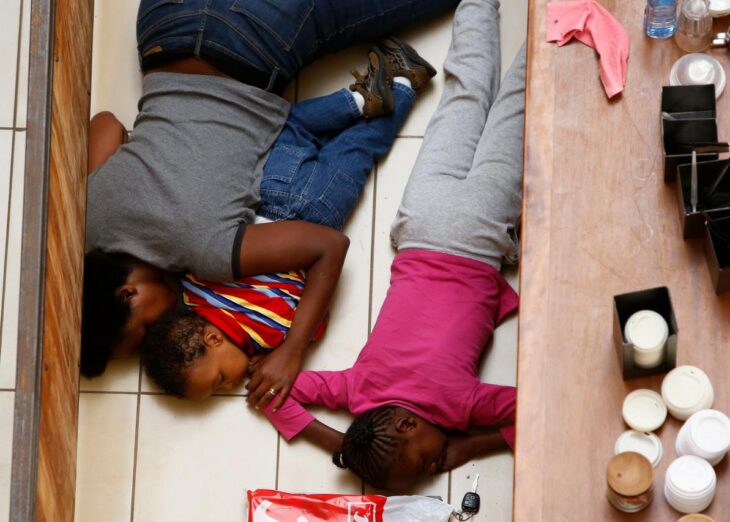NAIROBI, Kenya, Sept 21 – It is now 8 years since their heroic acts were immortalized on cameras across the world, revealing the resolute goodness in the hearts of men amidst a state of terror meted out on innocent people by a ‘faceless’, brutal enemy- hell-bent on sowing seeds of fear, destruction, and anarchy.
Events of that fateful Saturday would go on to shape the country’s view on the global fight against terror and forever changing Kenya’s security landscape.
It was your quintessential weekend, many spending the day with family and friends until the horrifically unexpected occurred.
On September 21, 2013, Al-Shabaab operatives stormed the popular Mwanzi Road-based Westgate Mall in the thriving Westlands neighbourhood in Kenya’s capital, Nairobi.
Sergeant Adan Iya, an officer with the Kenya Police Service received a call from his superiors while at the High Ridge camp. He was instructed to head to the Westgate Shopping Mall.
The top priority call requested immediate security intervention while citing that active combatants were at the scene.
“When I arrived at the scene, I could hear gunshots emanating from the mall. The tension was very high and no one knew who was shooting at the innocent civilians,” Sgt. Iya narrated the day’s events to Shahidi News.
His instincts from years in the service immediately kicked in as he cautiously took a sneak peek inside the mall from the entrance, strategizing on how he would respond to the distress calls. It was dangerous, possibly life-altering at the time, but he says he knew what he had to do in order to save lives.
“I saw bodies strewn from the entrance of the mall leading towards several shops on the ground floor. So many people were crying. I did not see the attackers but I knew what had to be done. When I went inside, a lot of people were hiding behind the counter at Artcaffe, I assisted them to leave,” he said.
“At this point, saw a caucasian man who was buried underneath some dead bodies and I managed to pull him out and escorted him to safety,” as if in deep thoughts or simply having a flashback of the horrific events.”
-Acting Dead to Survive-
While gingerly walking inside the mall looking for stranded civilians, Iya overheard several colleagues from the floor above calling his name. They were notifying him of a mother and her two children who were in distress.
The victim, identified as Faith Wambua was playing possum and instructed her children to do the same as the militants had been going round shooting at the people, where they hid.
Wambua had been lying on the floor for so long pretending to be dead, her left arm on her son as her daughter pressed in beside her. Sergeant Iya almost believed it.
The clicking sound of a photographer capturing the tense moment gave her some courage to raise her head. She later heard sounds of someone crawling towards her and later whispering:
“I’m with the police. You’re okay. You’re safe.”
“I decided to check whether she was alive and so I crawled towards her where there was a slight partition or a barrier and touched her. I realized she was alive. When she did not speak, I crawled on the other side so that she could see me. I assured her that I was a police officer and that I was there to rescue her and her children,” he said.
Proving difficult to convince, since minutes earlier the militants had been going round and shooting people dead under the guise of rescuing them, Wambua decided to remain silent.
At that moment after reintroducing himself as a police officer, it was her young daughter that boldly rose up and asked sergeant Iya:
“Are you are a bad guy?”
To which he responded by saying, “No, I am not a bad guy, I am a police officer“ as he proceeded to show him his uniform, underneath his tan blazer.
“I decided to pick up the young boy, who clutched onto me and the mother afterward believed me and realized I was telling the truth. She rose up, gingerly followed me as I led her daughter and son far from the potentially active shooting zone,” the gallant officer said.
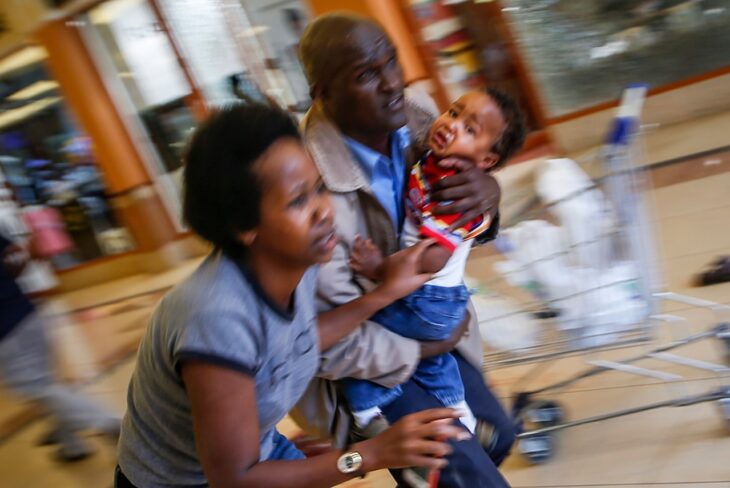
Pandemonium that characterized events earlier on was followed by an uncanny silence as they shortly after left the mall while being escorted out by yet another heroic officer, sergeant Tawfiq Baya.
At the end of the siege, 68 people were declared dead. Iya says that day has defined his life and that of his family members, who had initially expressed safety concerns while he was at the mall.
“My family and friends were concerned. They had asked me whether I had a death wish and whether I wanted to leave my children as orphans. I told them I was responding to people that needed help and that death would always come for me if God had ordained it,” he said.
Sergeant Iya, alongside other officers, has since been feted for his heroic act.
Questions however remain unanswered up to this day on the identity and number of the militants that stormed the shopping complex.
The siege lasted for four days before the government announced that the enemy had been neautralised. It was a traumatic incident, that with it, came a myriad of security lessons for the country.
And though the operation had its own challenges, security experts say the country is in a much better position today.
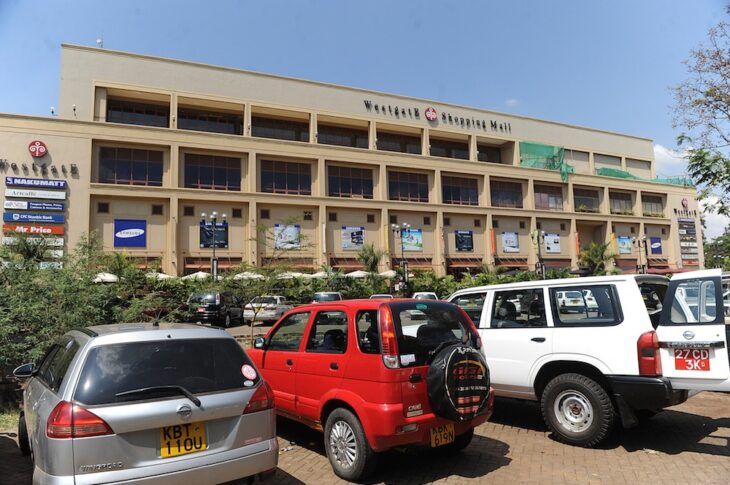
–Men accused of aiding terrorists during Westgate attack Charged–
On October 30, 2020, Mohammed Ahmed Abdi, one of the suspects, was sentenced to 33 years in jail while Hussein Hassan Mustafa, was sentenced to 18 years.
They were charged with planning and committing acts of terror, as well as supporting and helping a terrorist group.
A third suspect, Liban Abdullahi, was found not guilty and released. He was however moments after his release abducted by unknown men. He is yet one found.
–Fight against Terrorism in Kenya–
One of the country’s first recorded instances of alleged terror attacks was back in 1975 when a fairly young independent Kenya saw at least 27 people killed and 100 others injured at the OTC bus terminus.
According to authorities, no group claimed responsibility for the incident.
Just five years later, a known international terrorist with links in Jeddah, Saudi Arabia detonated a bomb at the Fairmont Norfolk Hotel in Nairobi killing at least 20 people.
The incident thrust Kenya to the global stage amidst heightened efforts to combat militant groups domiciled across the African continent and more so within East Africa.
On August 7, 1998, Al -Qaeda linked operatives bombed the US embassy building in Nairobi’s Central Business District (CBD), killing more than 200 people.
In what appeared to be simultaneous attacks, the US embassy in neighboring Tanzania was also bombed with Al -Qaeda leader, now deceased, Osama Bin Laden claiming responsibility for the attack. He said his terror organization had commenced Jihad, ‘a holy war’, against its enemies.
From there on, as Kenya strengthened its intelligence and security sector to avert future attacks, it was yet again across the early years faced with even bigger threats, from the 2002 Kikambala Hotel bombing, the Westgate Mall Attack in 2013, the Mpeketoni attacks in 2014, a series of bombings across Kenya’s North Eastern Counties including the attack on the Garissa University College in 2015, the 2019 DusitD2 attack among other incidents.
In April 2015 attack, 148 mostly Garissa University students were killed while 79 others sustained gunshot injuries.
During the last decade back in 2011, on October 6, Kenya sought to grab the enemy by the horn and entered Somalia in a bid to confront the enemy head-on, in a mission to protect and secure its territorial integrity.
Later on in 2012, the Kenya Defence Forces joined the Africa Union Mission in Somalia (AMISOM), in a continental military approach with the backing of the United Nations to restore peace in the Horn of Africa Nation.
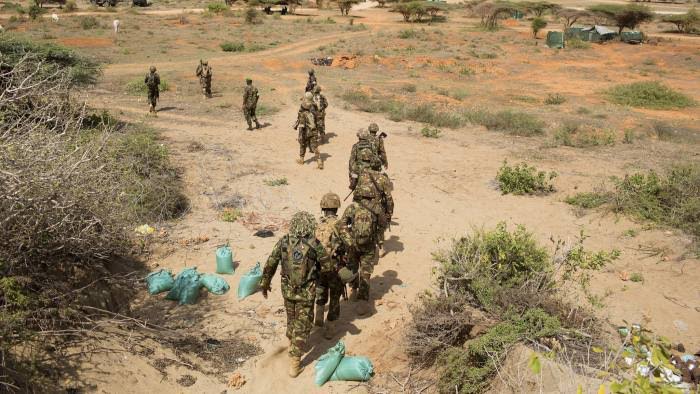
Though significant progress has been made, with the Al-Shabaab operatives being degraded, the Al-Qaeda linked organization still remains a viable threat to peace across the region. They still launch pockets of attacks targeting civilians, government installations, and security agencies in North-Eastern parts of Kenya.
In a bid to once and for all address the security conundrum facing the region and the world, Kenya has on several occasions attempted in vain to have the Al-Shabaab designated as a terror group alongside others such the Al-Qaeda, Taliban and ISIL under the United Nations Security Council Resolution 1276.
The Security Council can take several actions, which may not involve use of armed forces, including designating groups and individuals, in order to maintain or restore international peace and security, under Chapter VII of the UN Charter.
The Security Council however on August 28, 2019, rejected Kenya’s request to designate Al Shabaab as a terrorist organization.
Several international organizations such as US humanitarian agencies and envoys argued that the move would criminalize humanitarian aid.
“There would be a chilling effect in the humanitarian response,” said Mark Yarnell, senior advocate and U.N. liaison for Refugees International.
“Aid organizations would be concerned that if they carry out programs as they are doing now, without the humanitarian exemption, their work could essentially be criminalized.”
During an interview back in 2019, Kenya’s ambassador and permanent representative to the United Nations Martin Kimani said, it was time the world took seriously the threat of Al-Shabaab.
“We must make sure that the humanitarian aid that goes to Somalis who need help is not being taxed and utilized by the Al-Shabaab and for that reason, there is a big role for the International Community and the countries in the United Nations security council to stand up and enable us to fight terrorism financing in Somalia and give AMISOM the tools that they need,“ said Ambassador Kimani.
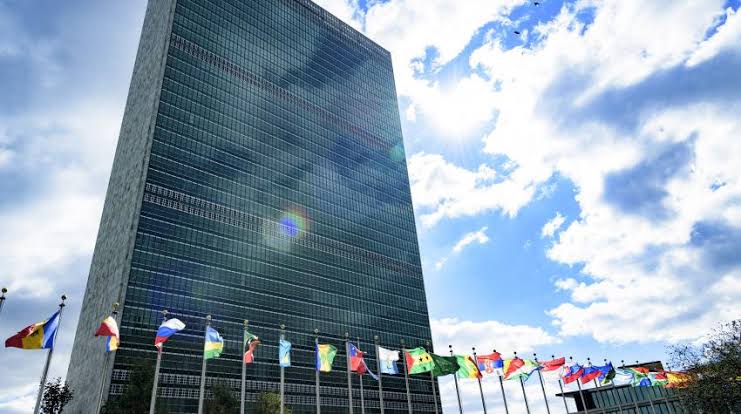
Several international groups have stated that arbitrary procedures for terrorist black-listing do not meet the due process requirements of fair trial and have affected a number of rights of targeted individuals including their right to privacy, the right to property, the right of association, or the right to travel or freedom of movement.
During a meeting with the European Union High Representative for Foreign Affairs and Security Policy, Federica Mogherini, Kenya’s Defence Cabinet Secretary Dr. Monica Juma argued that it was imperative to list Al-Shabaab as a terror organization amidst the threat they continue to pose across the region.
Ambassador Kimani continues to advocate for this move to be actualized at the global stage.
Want to send us a story? Contact Shahidi News Tel: +254115512797 (Mobile & WhatsApp)


